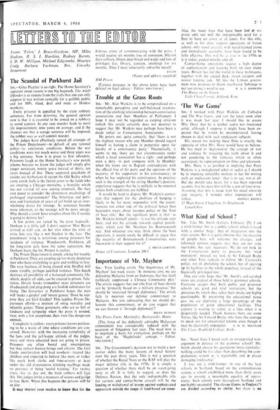Trouble at the Grass Roots SIR,--Mr. Alan Watkins is to
be congratulated on a remarkably perceptive and well-balanced examina- tion of the evolving relationship between constituency associations and their Members of Parliament. I hope it may not be regarded as carping criticism (which this article certainly does not deserve) to suggest that Mr. Watkins may perhaps have been a shade unfair to Conservative Associations.
He points out, quite correctly, that 'there is not the slightest reason why any Member should regard himself as having a claim in perpetuity upon the loyalty of a constituency party.' Theoretically, it seems to me. there are two circumstances under which a local association has a right—and perhaps even a duty—to part company with its Member: when his views are in flagrant contradiction with the official line of his party and the opinions of the majority of his supporters in his constituency; or when he has neglected his constituency. In practice. such is the strength of the sitting Member's position, experience suggests that he is unlikely to be removed unless both conditions are fulfilled.
It would be hard to dispute Mr. Watkins's conten- tion that support for the abolition of hanging is likely to be far more unpopular With the consti- tuencies (on either side of the political fence) than heterodox views about incomes policy or the 'East of Suez role.' But the significant point is that—as Mr. Watkins himself admits—it was his attitude over Suez. and not his attitude towards capital punish- ment, which cost Mr. Nicolson his Bournemouth seat. And whatever one may think about the Suez operation, it would surely be difficult to argue that the majority of Bournemouth Conservatives were lukewarm in their support for it?
J. BRUCE-GARDYNE
House of Commons. London. SW!


































 Previous page
Previous page